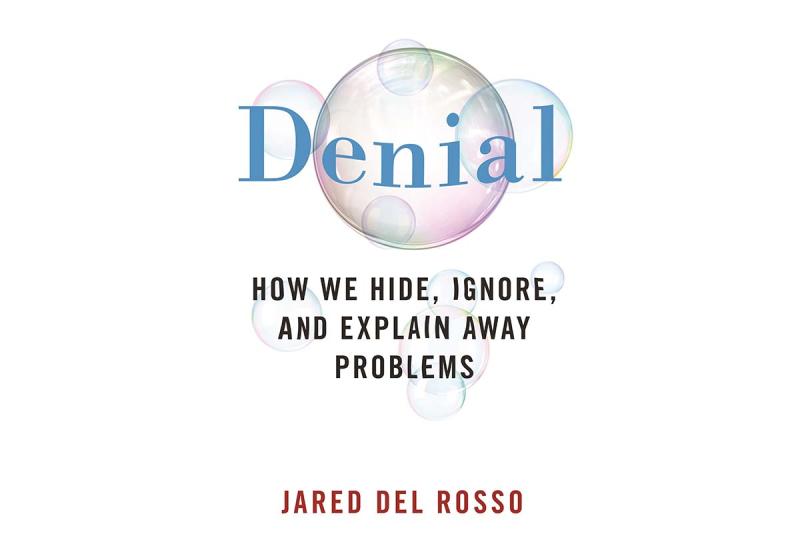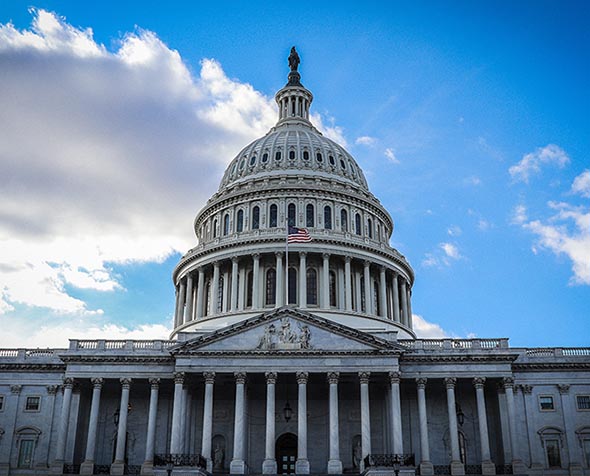Sociology Professor Explores Denial in New Book

Like the air we breathe, denial permeates the world around us. From avoiding embarrassment to avoiding hard truths, denial can be a comfortable choice.
Jared Del Rosso, associate professor in the Department of Sociology and Criminology, articulates this phenomenon in his new book “Denial, How We Hide, Ignore, and Explain Away Problems,” published by NYU Press. The book, a culmination of his interests and research, pays homage to his undergraduate course, Sociology of Denial.
Denial, Del Rosso says, is a basic social technique – a suppression of awareness. In its most innocent form, denial protects us and others from the disruption of embarrassment.
“We go to great lengths to avoid embarrassing ourselves, but when we’re audience to other people’s embarrassment, we get uncomfortable,” Del Rosso said. “We begin to not know how to act in relationship to them. If someone in your presence is embarrassed, you can begin to feel it yourself.”
To protect from those feelings, people often choose to be tactfully oblivious. But in a more sinister form, denial can be incredibly harmful, perpetuating misinformation, violence and systems of inequality.
Del Rosso’s interest in denial began in the late 90s. Haunted by the cost of human suffering caused by U.S. intervention overseas, Del Rosso began to explore the intricacies of repudiation.
In December 1998, the United States led a four-day bombing campaign against Iraq. A senior in high school, Del Rosso walked into his government class ready to discuss, but to his surprise, no one knew about it.
“This use of violence abroad had just kind of been erased,” Del Rosso said. “No one wanted to talk about it.”
More than 20 years later, collective denial continues to permeate our society in part because of the intentional use of language.
In the book, Del Rosso cites the Bush Administration’s Abu Ghraib scandal, the torturing of prisoners in Iraq, and the murder of George Floyd by a Minneapolis police officer in 2020. Photographic and video evidence showed the brutality committed. But with carefully crafted euphemisms, leaders redirected the narrative and downplayed the visual evidence.
“You try to push against the most consequential label. For the Abu Ghraib photographs, that label is torture. Torture is a war crime. It’s outlawed in international law, domestic law. It carries all kinds of historical baggage. So, the Bush Administration said, yes, Abu Ghraib happened. Yes, this is terrible, but this is not torture,” Del Rosso said.
Another strategy, like in the case of the Jan. 6 hearings on the attack at the U.S. capitol, is to delegitimize the investigation by calling it partisan.
“It goes kind of like this: Democrats or liberals don’t care when political violence is used by people politically aligned with them,” Del Rosso said. “What they’re doing is trying to pick out particular types of violence to discredit Republicans.”
With copious amounts of information available at our fingertips, humans are constantly filtering things out. Like a constantly shifting checklist, we prioritize certain social problems over others.
Classically, climate change denial is the refusal to believe it’s happening or the belief that the climate’s changing but not because of human causes. However, denial pervades society in other ways too.
“We find the problem overwhelming. We don’t know what to do, so we begin to tune out information,” Del Rosso said. “We go on living a life that looks normal. Even though we are worried about climate change, we act as if this problem is not pressing down on us in the way that it is.”
Still, Del Rosso says he remains optimistic. Because denial involves daily choices to erase problems, we can choose to disrupt it.
“It’s not, on the other hand, a force that’s somehow out of our control. So when we name it as such, when we disrupt it as such, we weaken denial. We also can begin building a fairer, more just society.”
Del Rosso’s book is available online. To purchase the book, click here.




